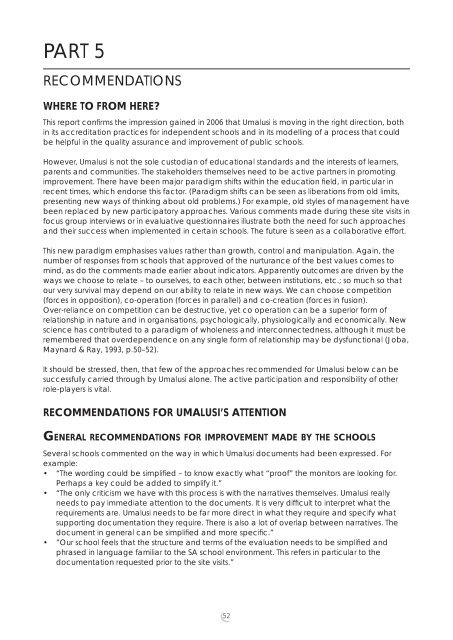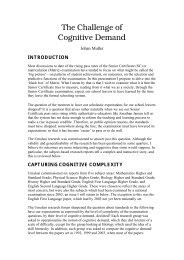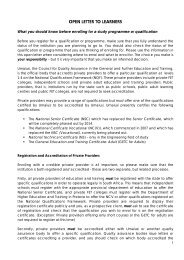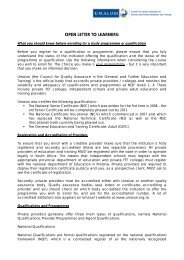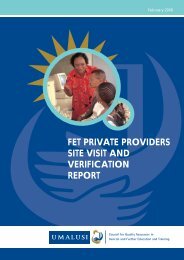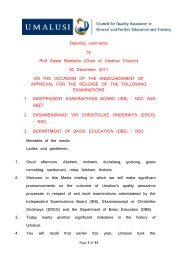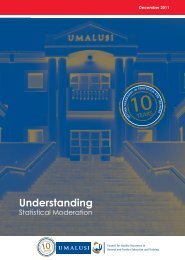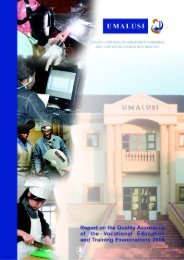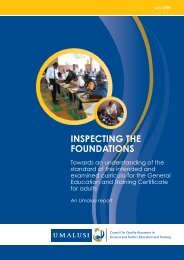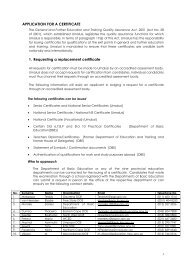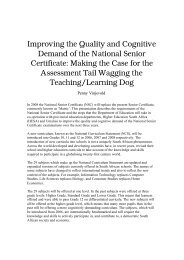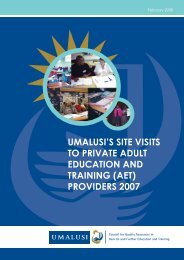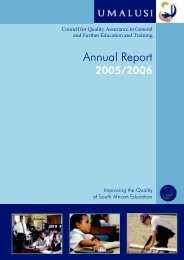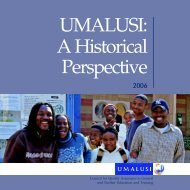UMALUSI'S SITE VISITS TO INDEPENDENT SCHOOLS IN 2007
UMALUSI'S SITE VISITS TO INDEPENDENT SCHOOLS IN 2007
UMALUSI'S SITE VISITS TO INDEPENDENT SCHOOLS IN 2007
- No tags were found...
Create successful ePaper yourself
Turn your PDF publications into a flip-book with our unique Google optimized e-Paper software.
PART 5RECOMMENDATIONSWHERE <strong>TO</strong> FROM HERE?This report confi rms the impression gained in 2006 that Umalusi is moving in the right direction, bothin its accreditation practices for independent schools and in its modelling of a process that couldbe helpful in the quality assurance and improvement of public schools.However, Umalusi is not the sole custodian of educational standards and the interests of learners,parents and communities. The stakeholders themselves need to be active partners in promotingimprovement. There have been major paradigm shifts within the education fi eld, in particular inrecent times, which endorse this factor. (Paradigm shifts can be seen as liberations from old limits,presenting new ways of thinking about old problems.) For example, old styles of management havebeen replaced by new participatory approaches. Various comments made during these site visits infocus group interviews or in evaluative questionnaires illustrate both the need for such approachesand their success when implemented in certain schools. The future is seen as a collaborative effort.This new paradigm emphasises values rather than growth, control and manipulation. Again, thenumber of responses from schools that approved of the nurturance of the best values comes tomind, as do the comments made earlier about indicators. Apparently outcomes are driven by theways we choose to relate – to ourselves, to each other, between institutions, etc.; so much so thatour very survival may depend on our ability to relate in new ways. We can choose competition(forces in opposition), co-operation (forces in parallel) and co-creation (forces in fusion).Over-reliance on competition can be destructive, yet co operation can be a superior form ofrelationship in nature and in organisations, psychologically, physiologically and economically. Newscience has contributed to a paradigm of wholeness and interconnectedness, although it must beremembered that overdependence on any single form of relationship may be dysfunctional (Joba,Maynard & Ray, 1993, p.50–52).It should be stressed, then, that few of the approaches recommended for Umalusi below can besuccessfully carried through by Umalusi alone. The active participation and responsibility of otherrole-players is vital.RECOMMENDATIONS FOR UMALUSI’S ATTENTIONGENERAL RECOMMENDATIONS FOR IMPROVEMENT MADE BY THE <strong>SCHOOLS</strong>Several schools commented on the way in which Umalusi documents had been expressed. Forexample:• “The wording could be simplifi ed – to know exactly what “proof” the monitors are looking for.Perhaps a key could be added to simplify it.”• “The only criticism we have with this process is with the narratives themselves. Umalusi reallyneeds to pay immediate attention to the documents. It is very diffi cult to interpret what therequirements are. Umalusi needs to be far more direct in what they require and specify whatsupporting documentation they require. There is also a lot of overlap between narratives. Thedocument in general can be simplifi ed and more specifi c.”• ”Our school feels that the structure and terms of the evaluation needs to be simplifi ed andphrased in language familiar to the SA school environment. This refers in particular to thedocumentation requested prior to the site visits.”52


